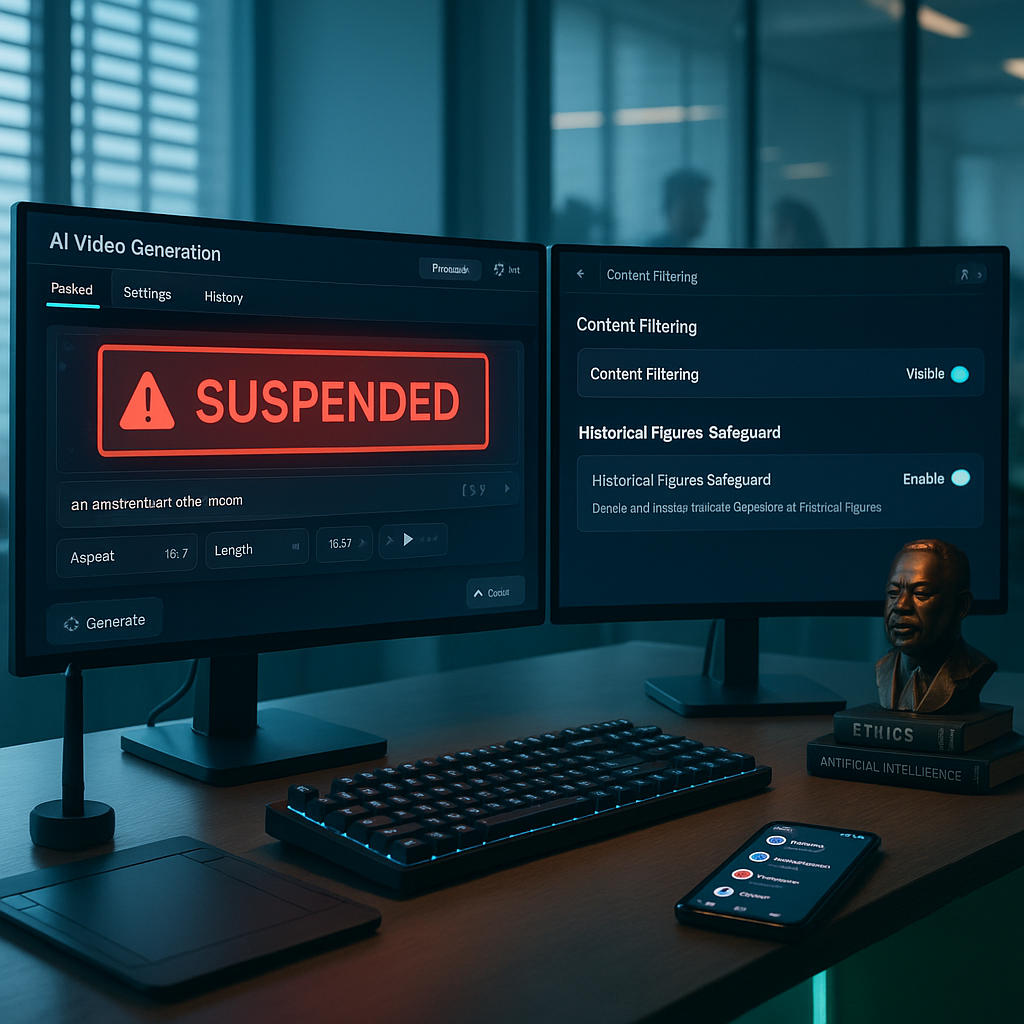Key Takeaways
- OpenAI suspends controversial video tool: The company paused its video generation product after criticism over AI-created images featuring Martin Luther King Jr.
- Backlash centers on ethical use: Social media users and civil rights advocates voiced concerns about appropriation of the late civil rights leader’s likeness without consent.
- Debate over digital likeness rights: The incident highlights unresolved questions about ownership and control of historical figures’ identities in AI-generated media.
- Focus shifts to platform guidelines: OpenAI faces increased pressure to set clearer rules for public figures’ images, influencing tech industry standards.
- No timeline set for relaunch: OpenAI said the tool will remain offline pending review of its policies and safeguards concerning historical figure representation.
Introduction
OpenAI has temporarily paused its new AI video generation tool after criticism erupted over its use of Martin Luther King Jr.’s likeness in generated content. The company announced the move on Thursday. This decision underscores growing concerns about ethical guidelines and digital rights as AI technology advances. It’s bringing up new debate over how public figures’ images should be managed on technology platforms.
Initial Suspension and Backlash
OpenAI suspended its AI video generation tool on Thursday following widespread criticism over AI-generated content depicting Martin Luther King Jr. The company announced the pause through its official blog and social media channels, citing serious concerns about historical figure representation.
The controversy began after several users shared AI-generated videos featuring Dr. King in scenarios that civil rights organizations described as “disrespectful” and “historically inaccurate.” These videos circulated widely on social media before the tool’s suspension.
Public pressure from civil rights advocates and tech ethicists quickly intensified. Marcus Thompson, director of the Digital Rights Coalition, stated that the unauthorized digital recreation of historical figures, especially civil rights leaders, raises profound ethical questions.
Un passo avanti. Sempre.
Unisciti al nostro canale Telegram per ricevere
aggiornamenti mirati, notizie selezionate e contenuti che fanno davvero la differenza.
Zero distrazioni, solo ciò che conta.
 Entra nel Canale
Entra nel Canale
Technical and Policy Response
OpenAI put an immediate stop to its video generation capabilities and launched a comprehensive policy review. The engineering team disabled access to video generation features across all user tiers.
Sarah Johnson, OpenAI’s communications director, explained that additional safeguards have been added to the content filtering system. She noted that the company is revising its approach to handling public figure representation in its models.
OpenAI also plans to consult with civil rights organizations, historians, and ethics experts during the review process. These consultations will focus on developing new guidelines for AI-generated content involving historical figures.
Industry Impact and Reactions
The decision by OpenAI prompted responses from other major tech companies and AI developers. Two leading AI firms even announced they would review their own safeguards for representing historical figures.
Civil rights organizations welcomed the suspension but called for permanent protections. Dr. James Williams of the Historical Preservation Alliance said that this isn’t just about technology, but about respecting the legacy of crucial historical figures.
Legal experts pointed to the complicated legal challenges at the intersection of AI and posthumous rights. Patricia Martinez, technology rights attorney at Digital Law Partners, explained that the situation reveals gaps in the current legal framework covering AI-generated content and personality rights. For a broader understanding of privacy and personal rights in the digital world, see end-to-end encryption.
Review Process and Guidelines
OpenAI outlined a three-phase review process to address the concerns raised. The first phase involves an internal policy assessment. The second will be consultations with external stakeholders. Only then will the company move on to developing new operational guidelines.
The company has committed to establishing clearer boundaries around AI-generated content featuring historical figures. OpenAI stated it would prioritize historical accuracy and cultural sensitivity in its updated policies. This emphasis on ethical AI and regulatory frameworks is being echoed across technology; for a comprehensive analysis, see EU AI Act.
According to experts familiar with the process, the review could take several weeks. OpenAI plans to release regular updates about its progress through official communication channels.
Conclusion
OpenAI’s rapid suspension of its AI video tool following user backlash reflects the growing demand for responsible handling of historical figures in generative technology. As the company moves forward with its policy review and external consultations, wider industry discussions on accuracy and ethics are likely to increase. Something to watch: updates from OpenAI’s ongoing review process and the anticipated release of revised guidelines in the coming weeks. For more context on how regulatory and transparency standards shape technology and digital rights, explore how digital declutter strategies help balance privacy, technology, and ethical platforms.





Leave a Reply